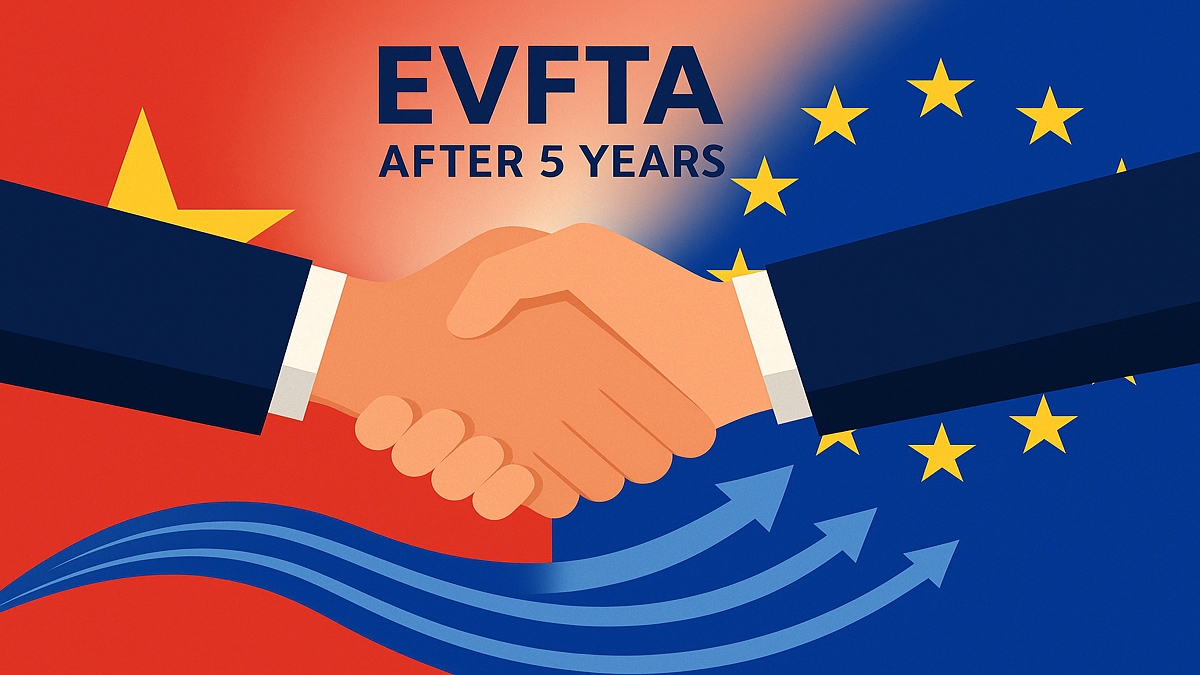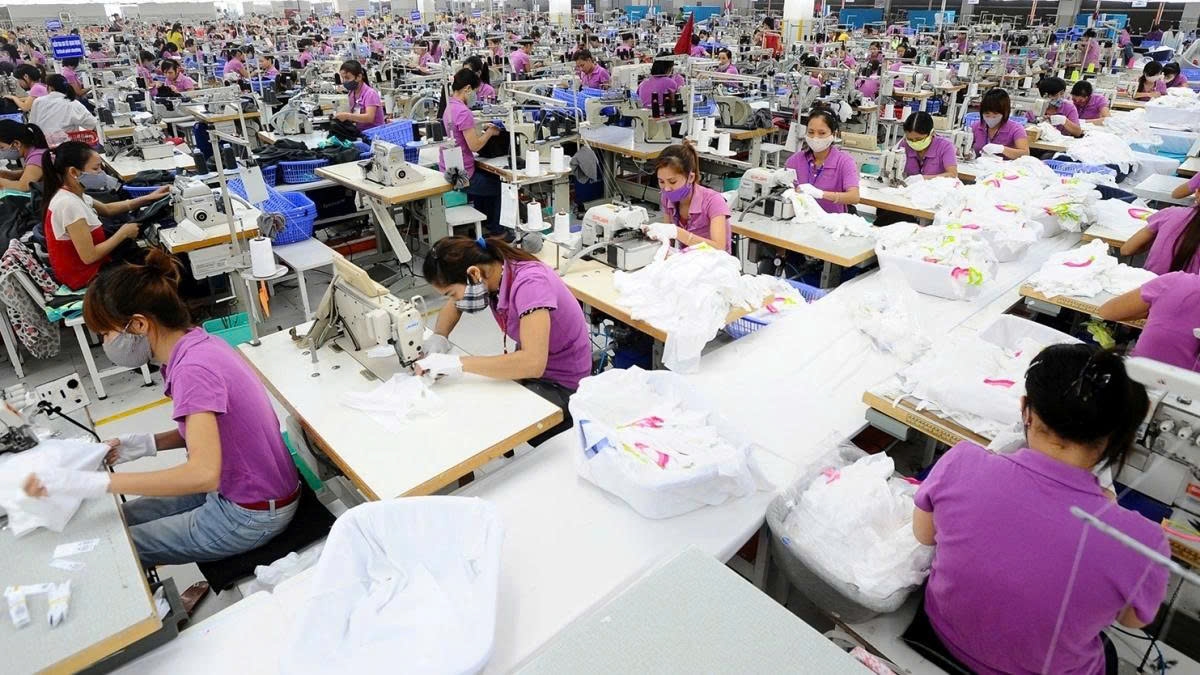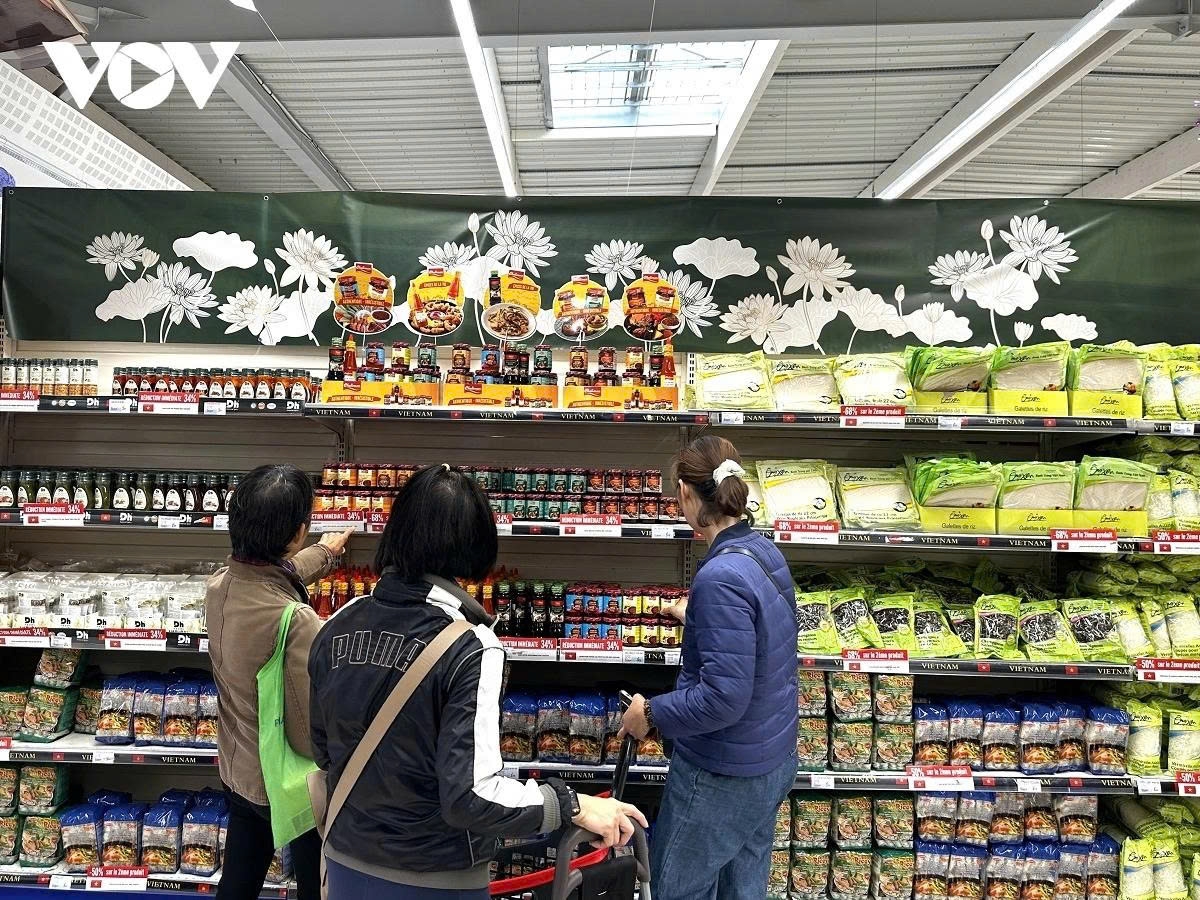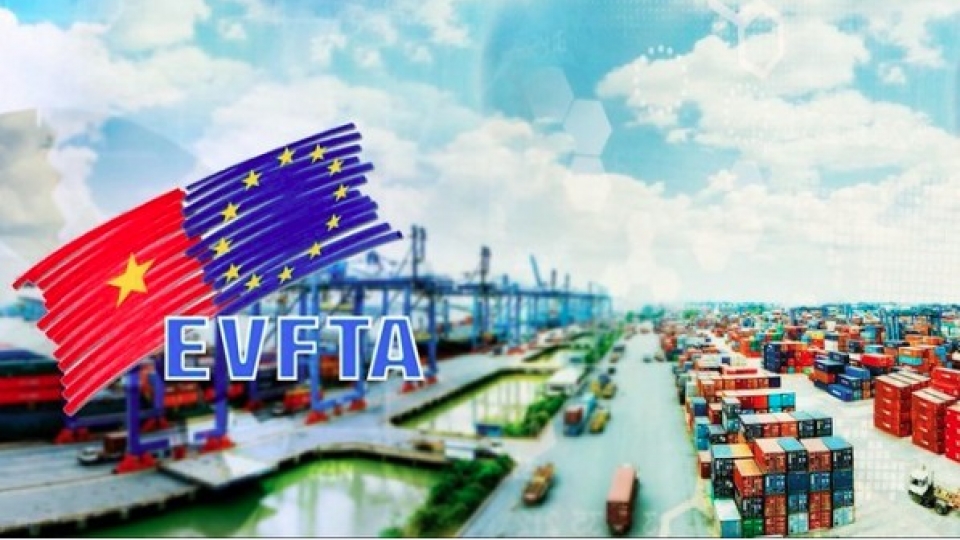EVFTA turns five: A catalyst for trade boom, institutional reform, global integration
VOV.VN - After five years in effect, the EU–Vietnam Free Trade Agreement (EVFTA) has not only sustained the momentum of bilateral trade growth but also marked a significant turning point in Vietnam’s institutional reform, development strategy, and the global competitiveness of Vietnamese goods.
Trade boom: Numbers speak for themselves

According to Vietnam Customs data, total trade between Vietnam and the EU reached over US$64.6 billion from 2020 to 2024, a 46.5% increase compared to the previous five-year period. Exports from Vietnam to the EU surged 56.4%, from US$31.1 billion to nearly US$48.7 billion, while imports rose by 13%, from US$14 billion to US$15.9 billion.
According to Vietnam Customs data, the total trade volume between Vietnam and the EU reached over US$64.6 billion from 2020 to 2024, a 46.5% increase compared to the previous five-year period. Vietnam’s exports to the EU grew by 56.4%, from US$31.1 billion to nearly US$48.7 billion, while imports from the EU rose 13%, from US$14 billion to US$15.9 billion.
Trade Counselor Dang Thi Thanh Phuong, head of the Vietnam Trade Office in Germany, says the EVFTA has proven to be a powerful tool, enabling Vietnamese businesses to expand market access and leverage tariff reductions. Upon the agreement’s entry into force on August 1, 2020, the EU immediately removed import duties on 85.6% of tariff lines, covering 70.3% of Vietnam’s exports, and his figure will reach 99.2% after seven years.
Many of key Vietnamese export sectors made remarkable strides in the EU market during 2020–2024, with coffee exports skyrocketing 120% from US$983 million in 2020 to US$2.2 billion in 2024; fruit and vegetable exports climbing 65.6%, from US$146 million to US$242 million; and footwear exports rising 52.4%, from US$3.7 billion to US$5.65 billion.
These results helped propel Vietnam to become the 10th largest export partner of the EU in 2024, with its share of the EU market rising from 1.5% to 2.2%.
This trade performance is even more remarkable given the context of the global and European economies facing a series of challenges, such as recession, supply chain disruptions, conflicts, and rising logistics costs due to container shortages and the need to reroute shipping through the Red Sea.
Despite these hurdles, the EVFTA has stood out as a resilient framework that has deepened economic ties between Vietnam and the EU. According to Trade Counselor Tran Ngoc Quan, head of the Vietnam Trade Office in Belgium and the EU, the agreement has helped maintain stability and foster new opportunities during a period of global uncertainty.
The success also reflects a broader shift within Vietnamese enterprises, especially larger firms, toward improving product quality and compliance with strict EU rules of origin and technical standards. This lays the groundwork for long-term, sustainable growth and deeper integration into global value chains.
However, not all sectors have been able to fully exploit the EVFTA’s benefits. Industries such as textiles, footwear, pharmaceuticals, and wood products still face structural and regulatory challenges.
In textiles and footwear, for instance, many businesses struggle to meet the rules, as raw materials are often sourced from countries outside the EVFTA bloc, such as China and the Republic of Korea, disqualifying their products from preferential tariffs.
The pharmaceutical sector has made little progress due to weak manufacturing capacity, lack of EU GMP certification, and limited competitiveness against original drugs from major EU corporations. Meanwhile, wood exports have declined due to strict EU requirements on legal sourcing, environmental responsibility, and product design that meets European consumer preferences.
Lasting impact on institutional reform

Beyond trade, one of the EVFTA’s most lasting and transformative impacts, according to Trade Counsellors, is promoting institutional reform in Vietnam toward greater transparency, sustainability, and alignment with international standards.
Specifically, Vietnam has ratified several core International Labour Organisation (ILO) conventions, such as Convention 98 on the right to collective bargaining, and Convention 105 on the abolition of forced labour. The revised Labour Code that came into effect in 2021 allows the formation of worker representative organisations independent of the Vietnam General Confederation of Labour, a key step in labour relations reform.
In environmental policy, the 2020 Environmental Protection Law was passed, emphasising extended producer responsibility (EPR), environmental impact assessments, and increased community involvement.
Regarding intellectual property, the 2022 amended Intellectual Property Law introduced stricter provisions on patent protection, geographical indications, and enforcement, aligning more closely with EVFTA commitments.
Nonetheless, Phuong notes that the implementation phase still faces many hurdles. Some independent labour organisations are not yet fully functional; environmental laws are unevenly enforced; and many businesses lack awareness and capacity to meet EVFTA obligations.
To address these issues, continued institutional improvement, technical assistance, training, and outreach are needed to help all economic actors adapt and thrive.
Boosting competitiveness to sustain advantages

Trade Counselor Phuong cautions that by 2027, the EU will have eliminated nearly all tariffs (99.2%), and up to 99.7% of Vietnam’s exports could be tariff-exempt. As the US increasingly imposes trade barriers, Vietnam’s existing FTA with the EU is a strategic advantage for market diversification and reducing dependency.
However, this edge is not guaranteed to last. The EU signed an FTA with the MERCOSUR bloc in December 2024 and is negotiating agreements with several of Vietnam’s competitors, including Thailand, Indonesia, Australia, and New Zealand.
Therefore, to stay competitive, Phuong says, Vietnamese businesses must accelerate technology upgrades, green transformation, workforce development, and localisation of input materials. This is the only way to fully harness the benefits of the EVFTA, deepen Vietnam’s integration into global value chains, and elevate the international reputation of Vietnamese products.
Similarly, to fully capitalise on the advantages offered by the EVFTA, Quan emphasises that businesses need to shift their mindset, invest in in-depth development, and build sustainable strategies that align with the new international standards being implemented or planned by the EU.
Five years on, the EVFTA has proven to be a strong catalyst for Vietnam’s trade, investment, and institutional reforms. The agreement has delivered tangible results and positioned Vietnam as a more competitive and reliable partner in the EU market. Still, continued reforms, capacity building, and strategic investments are essential if Vietnam is to sustain its momentum and lead the next chapter of global economic integration.





